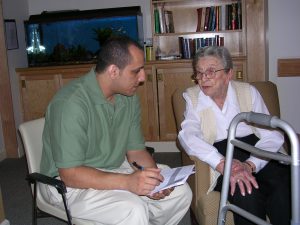This program teaches “a different dimension of compassion.” –UNC Program Mentor
UNC’s Senior Mentor Program was recently featured in the New York Times as part of a story on medical school programs that combat ageism in medical students. The story was widely shared and commented on, perhaps because of the refreshing perspective it offers on humorous, healthy older adults.
Through UNC’s Senior Mentor Program, older adults meet with first-year medical students to share their life stories and healthcare experiences. These young future physicians learn about their senior mentors as patients – and as people. Every spring, for four days per semester, MariJon M. and her husband invite two students into her home to eat a good meal and talk about patient care and aging.
Even as huge numbers of Americans transition to the elder years, geriatrics training is often a small sliver of the nation’s medical school curriculum. UNC’s Senior Mentor Program gives medical students early, meaningful experience with the ways the aging body and brain impact care. Its purpose is to improve the quality of care of future doctors and encourage medical school students to develop positive attitudes about caring for older adults.

The Senior Mentor Program is integrated into the Patient-Centered Care Course that all students take in Spring Semester. Senior Mentors are local, community-dwelling volunteers who meet with students four times during the semester for approximately 90 minutes per visit. Students apply their developing clinical skills during their interviews with mentors.
“They can ask us anything,” says MariJon, who has seen many doctors as a patient, and worked with many more throughout her career in nursing. Unfortunately, says MariJon, she has known doctors who were “very unskilled in compassion. Objectively, they had skills, but they had no compassion, no bedside manner.”
MariJon adds: “It’s not their fault. They weren’t taught.” Which explains why she and her husband volunteer – and recruit several neighbors – every year as senior mentors. “I just feel that the program teaches a different dimension of compassion.”
Mentors share both personal and medical information so that students learn about seniors as people, community members, and patients. Students accompany their mentors on a clinic visit to see the health care system from the older patient’s point of view.
“It’s nice to talk to young people and see their perception of where we’re coming from as older people and as older gay people,” said Terry P, who participated with his partner as first-time mentors in 2018. “We’re still growing, even at this age, and it was nice to see them growing as well.”
Senior Mentor Program will be back in Spring of 2019, and Center for Aging and Health is recruiting mentors now. If you’re interested or know someone who might make a good mentor, please contact Carol Julian at carol_julian@med.unc.edu.